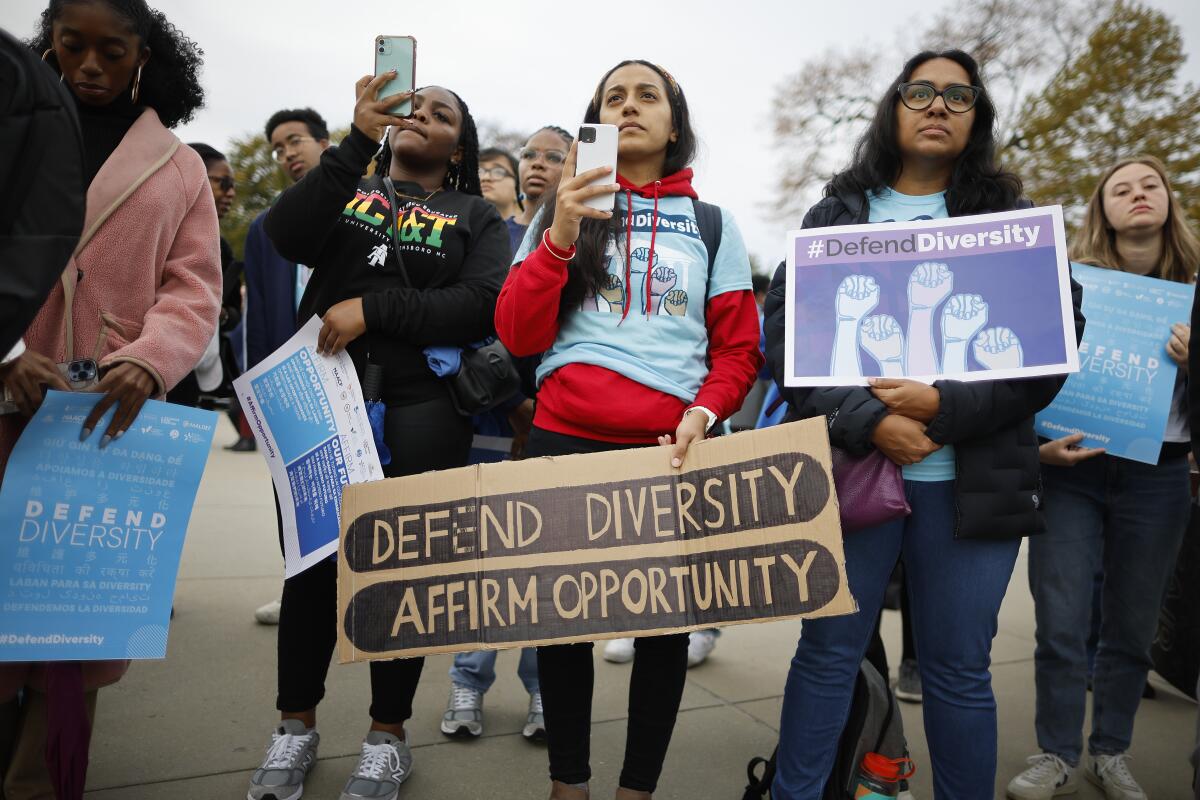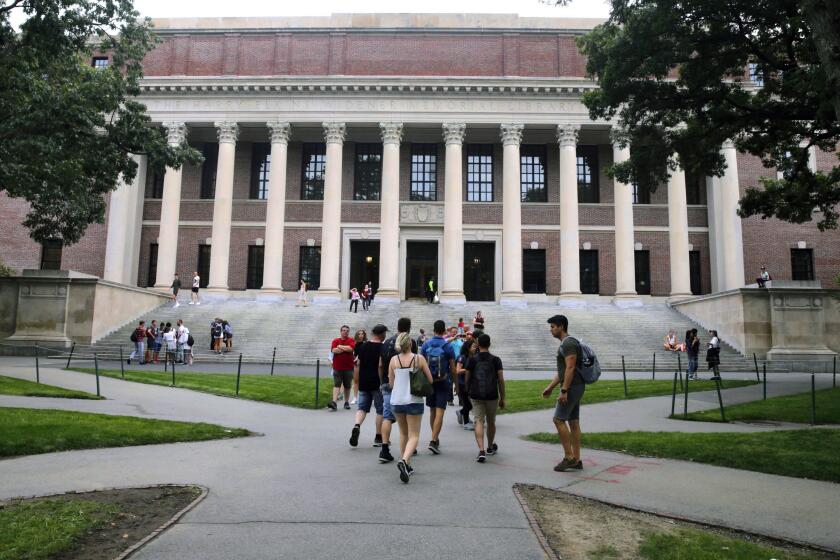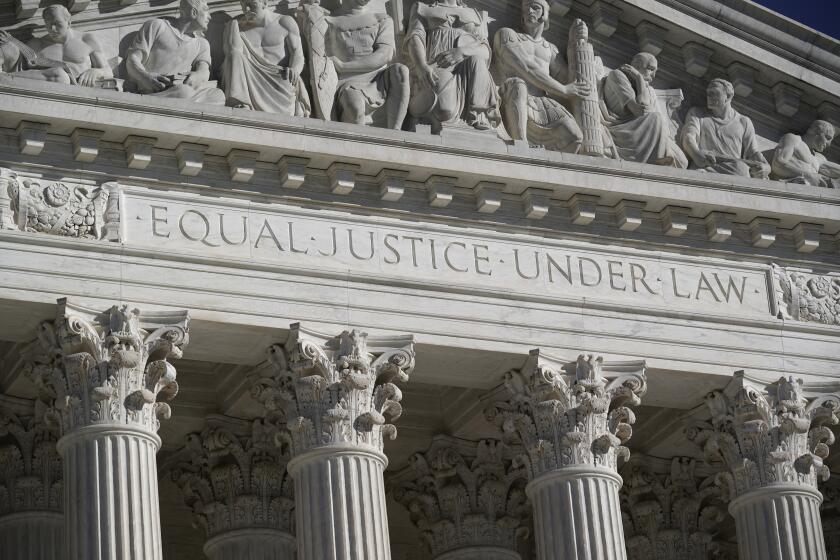Opinion: Affirmative action isn’t hurting Asian Americans. Here’s why that myth survives

- Share via
The Supreme Court’s ruling on affirmative action, focusing on whether Harvard’s consideration of race in admissions intentionally discriminates against Asian Americans, is expected this month. A big part of our research has been to identify anti-Asian discrimination, so we understand how charges that Asian Americans are held to a higher standard in college admissions might feel like another instance of anti-Asian bias. But we just don’t see an Asian American penalty in college admissions.
Potent myths about admissions circulate within and outside Asian American communities: “Asian Americans have to score higher than other students to get in” and “Asian Americans shouldn’t check the Asian box on applications.” These myths are often endorsed by college admissions advisors and accepted by parents and students, though not a single Asian American student has testified that they faced discrimination in the high profile Harvard case.
The faulty evidence for these myths rests in large part on the assumption that tests like the SAT are the best and fairest measures of merit. But the SAT has never been fair and is rooted in racism, developed by a racist eugenicist, Carl Brigham. Standardized test scores are more highly associated with parental education and family income than with college success or completion. Asian Americans have the highest education and incomes of any racial group, though there are significant variations in income and parental education among Asian Americans, with poverty rates among Hmong and Burmese Americans at more than 25%.
If the Supreme Court ends the program, first-generation students like me will continue to face inequities when it comes to higher education.
Considering factors beyond test scores does not amount to intentional discrimination targeting Asian Americans, but is an important acknowledgment that standardized tests reflect economic inequalities and are flawed indicators of merit. In fact, that is why the University of California no longer considers the SAT in admissions.
Still, the claim that Asian Americans have to score “140 points” more than white students to get into highly selective colleges has gone viral. Julie J. Park, a scholar of higher education, shows in “Race on Campus: Debunking Myths with Data” why this assertion is wrong. The SAT score differentials often cited are based on a study by Thomas Espenshade and Alexandria Radford that, when viewed without context, is quite misleading. Based on data collected in the 1990s, their research does not provide an actual score differential between groups. Why? Because the analysis does not include key elements in admissions files, including letters of recommendation and essays. Espenshade himself has said that the data do not establish racial bias.
Nevertheless, the conservative white legal activist Ed Blum is suing Harvard for allegedly penalizing Asian Americans. The complaint is not only on the SAT front, but also that Asian American applicants were subject to racial bias when it comes to Harvard’s “personal rating,” one of five ratings that go into an admissions score.
Justice Sandra Day O’Connor’s 2003 prediction that affirmative action college admissions would only last 25 more years may come true if the current court has its way. That would be tragic.
Here’s why we don’t buy that.
Blum’s suit makes much of the fact that the small numbers of Asian American applications his team reviewed contained comments reinforcing the “model minority” stereotype, portraying Asian Americans as passive nerds lacking leadership with phrases like “very quiet” and “quiet and strong.” But “very quiet” and “quiet and strong” were comments that appeared in the files of Black, Latino and white applicant files as well. The 2013-14 Harvard Interviewer Handbook highlights “introspection” and “the reflective introvert” as a “future leader.” Statistical models show positive, though not statistically significant, associations between admissions and Asian American identity for Asian American females and Asian Americans from California. We would expect to see statistically significant negative associations if intentional discrimination was at work here.
Asian Americans, like all nonwhite students, do face implicit bias. Importantly, Asian Americans experience both positive and negative forms of bias in college admissions. The stereotype of hard work and smarts can provide an advantage in some instances. But research shows that those who view Asian Americans through that lens are more likely to view other people of color as lacking a work ethic. Indeed, the model minority stereotype has long been used to undermine demands for equality for all.
Does the pursuit of admissions diversity by Harvard and the University of North Carolina violate civil rights laws? Supreme Court to decide.
These troubled dimensions of U.S. race relations are prominently displayed in the Harvard case, in which opportunities are treated as a zero-sum game, divided between a few haves and many have-nots. The lawsuit against Harvard exploits this fear and uses Asian Americans as an argument against affirmative action and against Black, Latino and Indigenous students, rather than drawing attention to the systemic problem of a society that allocates more and more resources to the already advantaged.
Harvard, for example, has an endowment of more than $50 billion, and more than half its students come from the top 10 percentile of American society. Of course, the overwhelming majority of students and parents won’t be affected by Harvard’s admissions policy, though the majority will be affected by college debt and underresourced state universities and community colleges. In California, 51% of Asian American college students attend community colleges.
This is why it’s heartening that the majority of Asian American registered voters surveyed say they favor “affirmative action programs designed to help Black people, women and other minorities get better access to higher education.” Indeed, some studies have shown that Asian American chances of admission to highly selective colleges actually increase when race-conscious policies are in place.
In California, the ban on affirmative action at public universities imposed more than 25 years ago had little positive impact for Asian Americans. Asian American and white students may have been marginally more likely to get into their first choice of college versus their second choice after the ban, but overall access to the top tier of UC campuses was unchanged, as were economic outcomes. The ban, however, had major negative impacts on Black and Latino students’ enrollment at the most prestigious campuses, drove down their applications to the UC system overall and dramatically decreased earnings over time.
Reducing college admissions to a simple and highly biased score overlooks the nuances and complexities of how race and inequality intersect. Affirmative action and race-conscious admissions are limited but necessary tools among many needed to address this intersection. They will not solve the problem of race and inequality by themselves, but without them, that problem will be made worse for all of us.
Janelle Wong is the director of Asian American Studies and a professor of American Studies and Government and Politics at the University of Maryland. Viet Thanh Nguyen is University Professor, Aerol Arnold Chair of English and Professor of English, American Studies and Ethnicity at USC.
More to Read
A cure for the common opinion
Get thought-provoking perspectives with our weekly newsletter.
You may occasionally receive promotional content from the Los Angeles Times.













